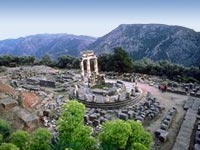| Fokida Prefecture |
Operation of the oracle  Apollo was represented by three priestesses when the oracle was at its peak, but later on by only one. They would be named Pythia, and be young and virgin. The age requirement later on was revised to 50 years old. The priestess was usually selected from women living in Delphi or the surrounding areas. Pythia uttered her prophesies after being purified by the waters of the sacred spring Kastalia. Apollo was represented by three priestesses when the oracle was at its peak, but later on by only one. They would be named Pythia, and be young and virgin. The age requirement later on was revised to 50 years old. The priestess was usually selected from women living in Delphi or the surrounding areas. Pythia uttered her prophesies after being purified by the waters of the sacred spring Kastalia.
The prophesies were then turned into verses and given to the requester. This ceremony was performed only once a year at Apollo's birthday, the 7th of Vissios month (February) and later at the 7th of every month except the three months during the winter. History of the oracle The oracle goes back to the Mycenaean period but earned its reputation as the center of the world, around the beginning of the 6th century B.C. Every four years, in honour of Apollo's victory over Python, the Pythion Games took place in Delphi. The games included contests, both athletic and musical, re-enactments of the battle between Apollo and Python, sacrifices and paeans. Due to the great importance of the oracle, a result of the religious and political power it had gained through the years, many wars broke out over who should control the area and the wealth it had gathered. The most important were four, called the "sacred wars", which took place from 600 to 339 B.C. and included battles among some of the greatest leaders in ancient Greece, such as Phillipos of Macedonia. The oracle suffered many more seizures and looting until the end of the millennium, as it met enemies from outside of Greece as well. Persians, Gauls and Romans conquered and took treasures from the city of Delphi. In 83 B.C., a Thracian tribe called Maides, coming from Northern Greece, raided the temple and the sacred fire that had burned for many centuries was extinguished. Finally, the oracle was placed under control of the Romans in 191 B.C. who held this post until its descent in the Byzantium years. |
|
| Hotels - Apartments - Suites throughout Greece | Car Rentals throughout Greece | Travel Agencies throughout Greece |
| Cruises & Sailing Yacht Charters in Greece |